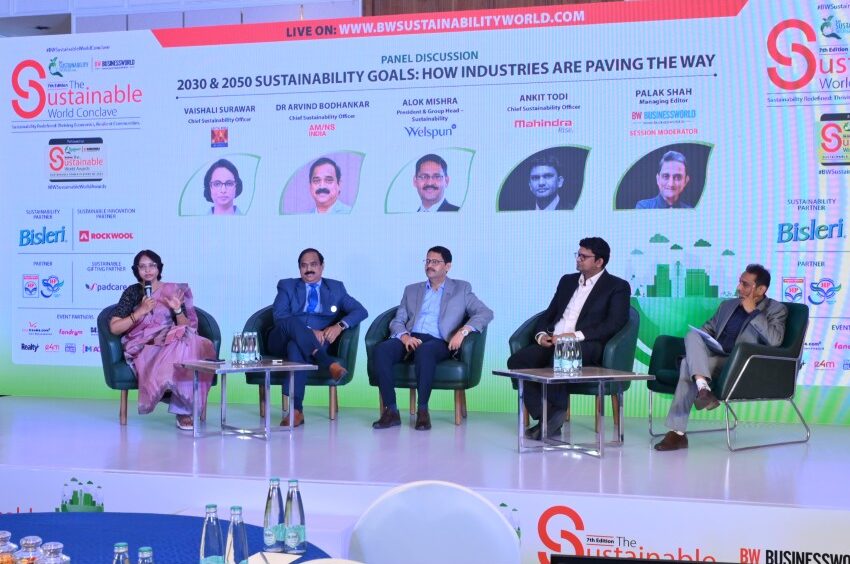India’s Energy Transition: A Sustainable Path To Net-zero

Companies such as Hindalco Industries, AM/NS India, Welspun Group, and Mahindra Group are implementing sustainable strategies to reduce their carbon footprints and contribute to the nation’s net-zero targets
Byline: Sangeet Kumar Sanu
India is at a crucial crossroads in its journey towards a sustainable and inclusive energy future. As the world’s most populous country and a rapidly growing economy, India’s commitment to achieving net-zero emissions by 2070 requires urgent and innovative action across policies, technology, and industrial reforms. With an installed energy capacity of 462 GW as of December 2024, of which 45 per cent comes from renewables, the country is making strides in strengthening energy security, mitigating climate risks, and driving economic growth while positioning itself as a global leader in clean energy.
The Role Of Industry In Sustainability
India’s industrial giants, particularly in metals, mining, and manufacturing, are at the forefront of this transformation. Companies such as Hindalco Industries, AM/NS India, Welspun Group, and Mahindra Group are implementing sustainable strategies to reduce their carbon footprints and contribute to the nation’s net-zero targets.
Vaishali Surawar, Chief Sustainability Officer at Hindalco Industries, emphasised the critical role of metals and mining in modern society, stating, “Metals are essential for human development. Whether it’s high-speed rail, mega solar parks, or electric vehicles, aluminum and copper play a critical role in India’s transformative journey.” Hindalco has set ambitious ESG (Environmental, Social, and Governance) targets, including zero waste to landfill across its 19 factories in India, with seven already certified by Bureau Veritas. Additionally, the company collaborates with IITs on 22 projects to repurpose industrial waste.
Steel Industry’s Sustainability Commitment
Arvind Bodhankar, Chief Sustainability Officer at AM/NS India, highlighted the steel industry’s impact on emissions, noting that steel production in India emits around 344 million tonnes of CO2 annually. Despite this, AM/NS India has made significant progress, achieving one of the lowest carbon footprints in the industry at 2.17 tonnes of CO2 per tonne of steel. The company has committed to reducing emissions by 20 per cent by 2030 and achieving net-zero by 2050. Efforts include increasing the use of recycled steel, enhancing energy efficiency, and supporting policies that promote circular economy initiatives.
Sustainable Practices Across Sectors
Alok Mishra, President and Group Head of Sustainability at Welspun Group, said that the diverse sustainability challenges across different industries, from textiles to infrastructure. “Each sector has its unique sustainability issues. In textiles, for example, we are shifting from conventional cotton to sustainable cotton to reduce environmental impact,” he explained. Water conservation is another key focus, with Welspun aiming to achieve water positivity in textile manufacturing.
Mahindra Group’s Planet Positive Mandate
Ankit Todi, Chief Sustainability Officer at Mahindra Group, outlined the company’s ‘Planet Positive’ mandate, which integrates sustainability with business strategy. “Sustainability is not just about incremental changes; it’s about reorienting entire industries,” he said. The company is investing in green products such as electric vehicles, net-zero buildings, renewable energy, and sustainable agriculture financing. Additionally, Mahindra Holidays is transforming its resorts into net-zero energy, water, and waste properties.
A Collective Commitment Towards Net-zero
As India marches towards its ambitious net-zero goal, collaboration between industries, government, and academia is crucial. The transition to clean energy, adoption of circular economy principles, and investment in sustainable technologies will determine India’s success in building a resilient, low-carbon economy. With industry leaders taking proactive steps, India is poised to lead the world in sustainable development while ensuring long-term economic growth and environmental preservation.
Experts were speaking at the seventh edition of BW Sustainable World Conclave.






































































































































































































































































































































































































































































































































































































































































































































































































































































































































































































































































































































































































